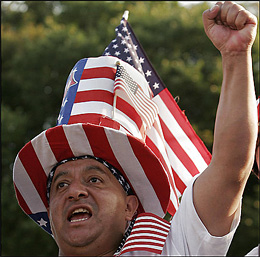 |
 |
 |
 News from Around the Americas | September 2006 News from Around the Americas | September 2006  
Bush's Approval Ratings Slumping Further in Europe
 Chris Cillizza & Zachary A. Goldfarb - Washington Post Chris Cillizza & Zachary A. Goldfarb - Washington Post


| | Many Hispanics feel disaffected with the political process and don't expect anything constructive to happen, regardless of who wins this fall.
(Washington Post) |
President Bush's approval ratings in the United States are nothing to cheer about, but he can count himself lucky that the midterm elections will not be held in Europe. A comprehensive survey of public opinion in a dozen European nations and the United States found that things have gone from bad to worse when it comes to disdain for the administration and its national security policies.

The annual survey, taken by the highly regarded German Marshall Fund of the United States, shows that 77 percent of Europeans disapprove of the way Bush has handled international affairs, as compared with 56 percent who felt that way in GMF's "Transatlantic Trends" survey in 2002.

Asked how desirable it was for the United States to exert strong leadership on the world stage, 37 percent of Europeans said that should be a goal - down from 64 percent five years ago. In this country, 82 percent of Americans think it is very desirable or somewhat desirable for the United States to exert leadership.

Anyone who has seen the large antiwar rallies in Europe on television won't be surprised that people living on the other side of the Atlantic are less than enthusiastic in their views toward Bush and America's role in the world.

But, the GMF poll, which tested approximately 1,000 people in each of the countries it surveyed, also found interesting nuances in attitudes of those residing across the pond.

Even though Europeans' views of Bush have collapsed over the past five years, their fears about the threat posed by international terrorism have grown closer to Bush's view. Sixty-six percent of Europeans called terrorism an "extremely important" threat, up eight percentage points since last year. In Britain, which has been the target of several terrorist operations in the past year, the number of those viewing terrorism as a main priority rose by 22 percentage points. But Europeans remained wary of military action as the answer to security threats, and they put greater emphasis on diplomacy.

GMF President Craig Kennedy said the survey revealed "broad agreement on threats across the Atlantic and a profound division on how to deal with them."

Some Democrats, however, have suggested that the majority opinion in the United States has grown closer to a European outlook. Democratic pollster Mark Mellman said he recently conducted a poll finding that 31 percent believed that it is better for the United States to "act on its own because we can act more decisively and effectively in our national interest." Twice as many said it is better to work through multilateral institutions such as the United Nations.

"The American public prefers multilateralism wherever possible because they understand that our strength in confronting terror rests in part on the cohesion of our alliances," Mellman said.

Hispanics' Clout Massive

The huge rallies earlier this year of Hispanics alarmed by anti-immigration sentiments seemed to presage the potential of this group as a voting bloc this fall. "Today We March, Tomorrow We Vote" was one popular slogan.

But as Nov. 7 nears, some analysts are wondering whether reality will match anticipation. An analysis by the Associated Press of voter registration data in 12 U.S. cities with substantial Hispanic populations - including Los Angeles, Houston and Atlanta - did not find a major spike in voter registration.

The news agency found that there were fewer new registrants through July in every city, compared with 2004 figures. Presidential elections ordinarily excite more interest among nearly all voters, so that lag is not entirely a surprise. It also suggests that 2006 may not be the year Hispanics fully exercise the clout that could come with rising numbers.

Clarissa Martinez, director of state and local public policy at the National Council of La Raza, said this year's demonstrations and voter mobilization efforts will have a long-term impact, even if the immediate effect is not so dramatic. She said aggressive work is being done to naturalize immigrants, which will mean more voters and higher turnout. "A couple of things are in motion, some of which will be felt in '06, but the real effect will be in '08," she said.

Robert de Posada, a former president of the Latino Coalition, questioned whether the demonstrations, while initially energizing Hispanics, might ultimately have had negative consequences. "It turned off a lot of people who did not like the tone of the debate on both extremes," he said.

He said many Hispanics feel disaffected with the political process and don't expect anything constructive to happen, regardless of who wins this fall.

Hispanics are the fastest-growing segment of the population in the United States, but they are less likely than whites or blacks to vote. From 2000 through 2004, according to the Pew Hispanic Center, they accounted for half of U.S. population growth but only a 10th of the increase in votes cast. | 
 | |
 |



